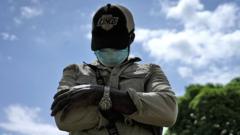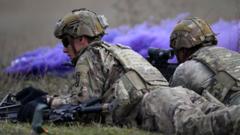The security landscape in Pakistan is deteriorating again, as political turmoil, dwindling public support, and economic trouble create conditions for terrorism to flourish. Following a decade of relative peace after the 2014 Peshawar school massacre, recent reports show a troubling rise in violence attributed to both the Pakistani Taliban and ethnic separatist groups, leading to fears of a return to past horrors.
A Decade of Struggle: The Resurgence of Terrorism in Pakistan

A Decade of Struggle: The Resurgence of Terrorism in Pakistan
As Pakistan commemorates ten years since a tragic school attack, concerns grow over the resurgence of terrorism amid political instability and economic challenges.
The article text:
A decade has passed since the harrowing attack on a military-run school in Peshawar, Pakistan, where nearly 150 individuals, predominantly children, lost their lives at the hands of the Pakistani Taliban. This tragic event catalyzed a national movement toward a stringent counterterrorism strategy, resulting in a temporary reduction of violence across the country. Yet, on the anniversary of the assault, many parents and families are left grappling with an unsettling realization: the sacrifices made to secure a safer environment for their children may have been in vain.
In the wake of the attack, Pakistan mobilized its military in a significant campaign aimed at rooting out terrorism, focusing on areas along the Afghan border that were historically known for harboring militants. This intervention succeeded for some time, as reported fatalities from terrorist activities plummeted from over 2,400 in 2013 to 220 in 2020. However, recent developments indicate that these hard-won gains are starting to unravel, attributed largely to the changing political dynamics in neighboring Afghanistan since the Taliban's resurgence in 2021.
As experts underscore, the Afghani context heavily influences Pakistan's security environment. Analysts argue that the Afghan Taliban’s governance has inadvertently empowered the Pakistani Taliban (TTP), allowing it to develop into a more formidable threat. The TTP has capitalized on this newfound support to launch a string of violent attacks aimed at destabilizing the Pakistani state, exemplified by a tragic suicide bombing earlier this year that claimed the lives of over 100 people.
In addition to the threats posed by the TTP, separatist groups in the southwestern province of Baluchistan have intensified their assaults, often targeting Chinese nationals involved in significant investment projects through the Belt and Road Initiative. With the Chinese government's investments pivotal to Pakistan's faltering economy, these attacks place further strain on the nation's stability, drawing an urgent spotlight on security issues.
Violence has intensified in Khyber Pakhtunkhwa, where the Interior Ministry reported that nearly 924 individuals, comprising civilians and law enforcement, fell victim to terrorist attacks within just ten months. The government's responses to such threats, including the announcement of a renewed military effort against separatist groups, face challenges in political sentiment and financial viability.
Political instability in Pakistan brings additional layers of complexity to effectively addressing terrorism. The country finds itself divided over issues surrounding the controversial detention of former Prime Minister Imran Khan. Public opinion is fragmented, and recent calls for military action against terrorism are met with skepticism among citizens who recall the extreme human and economic costs associated with the previous counterinsurgency operations.
Similarly, the public sentiment, once united against terrorism, has started wavering. Communities, particularly in regions formerly plagued by violence, now witness increasing extortion from militant groups like the TTP, leaving many fearful for their safety and uncertain about the government’s response.
As the anniversary of the school attack nears, voices like Jamaluddin Afridi resonate within affected communities — a stark reminder of the lingering scars from past escalations. Parents express a profound anxiety that history might repeat itself unless robust actions to counter terrorism are undertaken, creating a critical juncture for Pakistan's future security strategy. The juxtaposition of haunting memories against the persistent threat of violence leaves many wondering what it will take for the state to prioritize their safety and counter the receding resolve against terrorism.
A decade has passed since the harrowing attack on a military-run school in Peshawar, Pakistan, where nearly 150 individuals, predominantly children, lost their lives at the hands of the Pakistani Taliban. This tragic event catalyzed a national movement toward a stringent counterterrorism strategy, resulting in a temporary reduction of violence across the country. Yet, on the anniversary of the assault, many parents and families are left grappling with an unsettling realization: the sacrifices made to secure a safer environment for their children may have been in vain.
In the wake of the attack, Pakistan mobilized its military in a significant campaign aimed at rooting out terrorism, focusing on areas along the Afghan border that were historically known for harboring militants. This intervention succeeded for some time, as reported fatalities from terrorist activities plummeted from over 2,400 in 2013 to 220 in 2020. However, recent developments indicate that these hard-won gains are starting to unravel, attributed largely to the changing political dynamics in neighboring Afghanistan since the Taliban's resurgence in 2021.
As experts underscore, the Afghani context heavily influences Pakistan's security environment. Analysts argue that the Afghan Taliban’s governance has inadvertently empowered the Pakistani Taliban (TTP), allowing it to develop into a more formidable threat. The TTP has capitalized on this newfound support to launch a string of violent attacks aimed at destabilizing the Pakistani state, exemplified by a tragic suicide bombing earlier this year that claimed the lives of over 100 people.
In addition to the threats posed by the TTP, separatist groups in the southwestern province of Baluchistan have intensified their assaults, often targeting Chinese nationals involved in significant investment projects through the Belt and Road Initiative. With the Chinese government's investments pivotal to Pakistan's faltering economy, these attacks place further strain on the nation's stability, drawing an urgent spotlight on security issues.
Violence has intensified in Khyber Pakhtunkhwa, where the Interior Ministry reported that nearly 924 individuals, comprising civilians and law enforcement, fell victim to terrorist attacks within just ten months. The government's responses to such threats, including the announcement of a renewed military effort against separatist groups, face challenges in political sentiment and financial viability.
Political instability in Pakistan brings additional layers of complexity to effectively addressing terrorism. The country finds itself divided over issues surrounding the controversial detention of former Prime Minister Imran Khan. Public opinion is fragmented, and recent calls for military action against terrorism are met with skepticism among citizens who recall the extreme human and economic costs associated with the previous counterinsurgency operations.
Similarly, the public sentiment, once united against terrorism, has started wavering. Communities, particularly in regions formerly plagued by violence, now witness increasing extortion from militant groups like the TTP, leaving many fearful for their safety and uncertain about the government’s response.
As the anniversary of the school attack nears, voices like Jamaluddin Afridi resonate within affected communities — a stark reminder of the lingering scars from past escalations. Parents express a profound anxiety that history might repeat itself unless robust actions to counter terrorism are undertaken, creating a critical juncture for Pakistan's future security strategy. The juxtaposition of haunting memories against the persistent threat of violence leaves many wondering what it will take for the state to prioritize their safety and counter the receding resolve against terrorism.




















